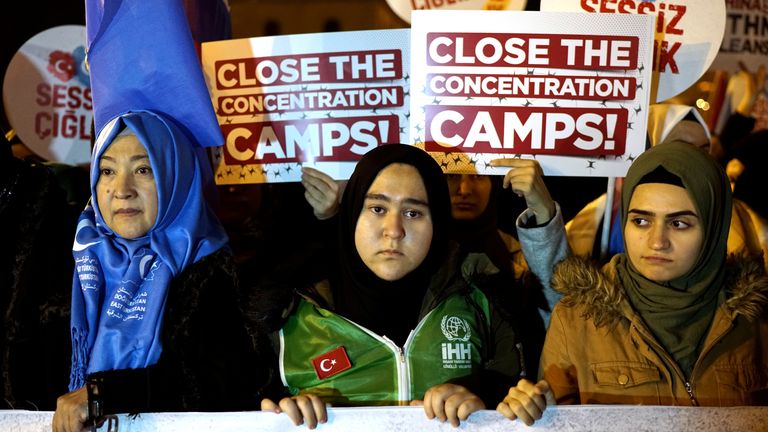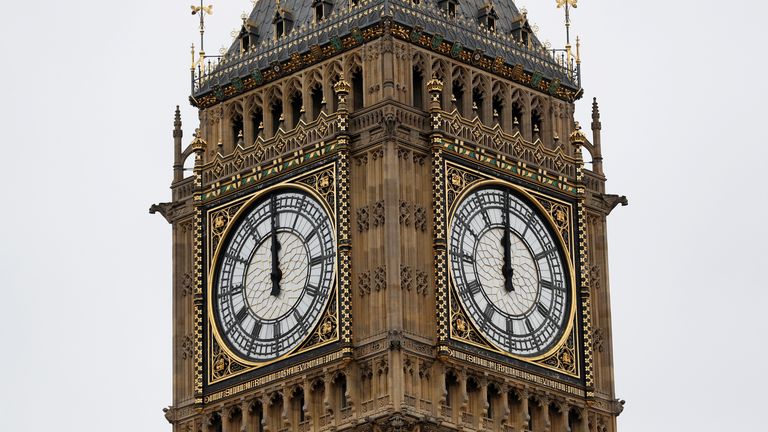Tory rebels have expressed their fury after the government rammed through a compromise deal on blocking trade agreements with countries that have committed genocide.
Some backbenchers were incensed by the move to deny MPs a vote on an amendment to the Trade Bill that would have handed the power of the decision to the courts.
It was bundled together with a Labour amendment meaning the proposal could not be voted on separately, while a government-backed amendment watering down the proposal to hand powers to a select committee could be voted on.
The latter passed by 318 votes to 303 - a thin majority of 15 considering the Conservatives have a majority of 80 in the Commons.
Trade minister Greg Hands denied there was anything untoward about the procedure.
The issue has inflamed tension because of claims China's treatment of Muslims and ethnic minorities in the Xinjiang region constitutes genocide.
Iain Duncan Smith, a Conservative MP and former party leader, said on Tuesday that the government's tactics were "beneath them".
He likened the debate over procedure to the viral Handforth Parish Council meeting, saying it was "always a good idea to read the standing orders".
"I read them and it told me what happened - the government deliberately has blocked this," he quipped.
Mr Duncan Smith said the power to determine whether genocide had been committed should remain with the courts because judges are meant to be impartial and trained to take evidence.
"We're partial that's why we're here - we have prejudices and that's the point," he explained in an attempt to rebut the suggestion of handing power instead to a select committee of MPs.
The former cabinet minister added: "Instead of a beacon of light and hope, today what we have done is go into the dark corridors of procedural purdah and we need to emerge."
Nusrat Ghani, a backbench Tory MP, also said she was "appalled at the parliamentary games played" by the government, but vowed: "We won't let this principle go away."
She called the government-backed amendment "meaningless" and added: "On this day men and women in this House were ready to vote on the genocide amendment; to lead the world in standing up to tyrannical regimes who commit genocide; to honour our vow of never again; to ensure we are never complicit in genocidal trade; and to put Britain on the right side of history.
"Today we were denied that vote and this House was denied its say."
Trade minister Greg Hands said expanding the role of the courts would be "inappropriate" and have "harmful unintended consequences".
He also said in the "highly probable" scenario where a judge would be unable to rule a genocide had been committed, that would be a "huge propaganda win for the country in question".
"Rather than help persecuted people we'd be setting their cause back further," he explained.
Earlier, Labour's shadow trade secretary Emily Thornberry said "future generations will ask themselves why on earth the government of the day was playing procedural parly games on an issue as serious and momentous as the genocidal crimes."
The Labour whips also said afterwards: "It's clear why the Conservative government moved heaven and earth to avoid a straight vote on genocide. Suspect this is coming back again. Really shameful behaviour from the government."
Despite the vote on Tuesday, it is not necessarily the end of the road for the Tory rebels.
Mr Duncan Smith said he hoped peers will put their original amendment back in when it goes back to the House of Lords for the third time, and that a straightforward vote on it will be offered when it arrives back in the Commons.
It comes nearly a month after the government narrowly won a vote on a similar issue, with 33 Tory rebellions.






